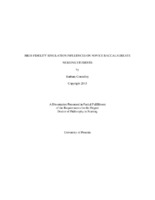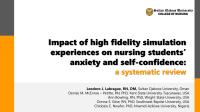| dc.contributor.advisor | Kroposki, Margaret | en |
| dc.contributor.advisor | Grendell, Ruth | en |
| dc.contributor.advisor | Rasmussen, Nat | en |
| dc.contributor.author | Connelley, Barbara | en |
| dc.date.accessioned | 2016-12-22T16:33:48Z | |
| dc.date.available | 2016-12-22T16:33:48Z | |
| dc.date.issued | 2016-12-22 | |
| dc.identifier.uri | http://hdl.handle.net/10755/621174 | |
| dc.description | <p>This item has not gone through this repository's peer-review process, but has been accepted by the indicated university or college in partial fulfillment of the requirements for the specified degree.</p> | en |
| dc.description.abstract | <p>Current research supports high-fidelity simulation use as a method for educating junior and senior nursing students. The purpose of this study was to examine the relationship that existed between the use of evidence-based high-fidelity simulation and the novice baccalaureate nursing students’ development of their nursing knowledge, performance skills, critical thinking skills, and self-confidence. A four-year university that offered a Bachelor of Science degree in nursing was the site of the study. This quasi-experimental quantitative study used a simple interrupted time-series, nonequivalent dependent variables, within-group design. Novice baccalaureate nursing students enrolled in their first theory and clinical course comprised the convenience sample. A pretest-posttest assessed their nursing knowledge; the National League of Nursing Questionnaires evaluated the students’ perspective of critical thinking skills, performance skills, and self-confidence. The Creighton Simulation Evaluation Instrument evaluated the students’ performance skills, critical thinking skills, and self-confidence from the faculty perspective. A paired t-test correlated the data results of the NLN Questionnaires and the Creighton Simulation Evaluation Instrument. From the students’ perspective the results indicated no direct relationship between high-fidelity simulation and nursing knowledge, skills, critical thinking, and self-confidence. From the faculty perspective the results did suggest that high-fidelity simulation may influence the novice baccalaureate nursing students’ performance skills and critical thinking skills. Additional research is needed to support high-fidelity simulation as an education method that influences the development of nursing knowledge, performance skills, critical thinking skills, and self-confidence in novice baccalaureate nursing students.</p> | en |
| dc.format | Text-based Document | en |
| dc.language.iso | en_US | en |
| dc.subject | Health and environmental sciences | en |
| dc.subject | Education | en |
| dc.subject | Critical thinking skills | en |
| dc.subject | High-fidelity simulation | en |
| dc.subject | Nursing education | en |
| dc.subject | Performance skills | en |
| dc.subject | Self-confidence | en |
| dc.title | High-fidelity simulation influences on novice baccalaureate nursing students | en |
| dc.type | Dissertation | en |
| dc.rights.holder | <p>
All rights reserved by the author(s) and/or publisher(s) listed in this item record unless relinquished in whole or part by a rights notation or a Creative Commons License present in this item record.
</p><p>
All permission requests should be directed accordingly and not to the Sigma Repository.
</p><p>
All submitting authors or publishers have affirmed that when using material in their work where they do not own copyright, they have obtained permission of the copyright holder prior to submission and the rights holder has been acknowledged as necessary.
</p> | |
| dc.description.note | <p>This dissertation has also been disseminated through the ProQuest Dissertations and Theses database. Dissertation/thesis number: 3746435; ProQuest document ID: 1760162652. Copyright is held by the author.</p> | |
| thesis.degree.grantor | University of Phoenix | en |
| thesis.degree.level | PhD | en |
| thesis.degree.year | 2015 | |
| dc.type.category | Full-text | en |
| dc.evidence.level | Quasi-Experimental Study, Other | en |
| dc.research.approach | Quantitative Research | en |
| dc.subject.cinahl | Simulations | en |
| dc.subject.cinahl | Students, Nursing, Baccalaureate | en |
| dc.subject.cinahl | Education, Nursing, Baccalaureate | en |
| dc.subject.cinahl | Nursing Skills | en |
| dc.subject.cinahl | Nursing Knowledge | en |
| dc.subject.cinahl | Critical Thinking | en |
| dc.subject.cinahl | Critical Thinking--Education | en |
| dc.contributor.department | Nu Pi at-Large | en |
| dc.author.details | Barbara Connelley, PhD, MSN, BSN | en |
| dc.description.reviewtype | None: Degree-based Submission | en |
| dc.description.acquisition | Proxy-submission | en |





